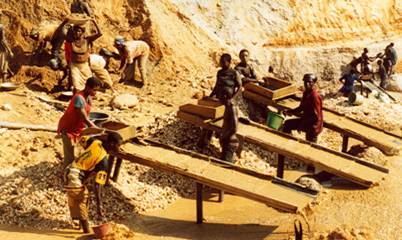The mining and oil-and gas production companies in Ghana show the families, communities, and the country that the net impact of their operations from exploration to post-closure is positive for them, the ecosystems, and for their livelihoods. Mining companies have often thought in the past that they could “gain an advantage by negotiating with weak communities” according to Paul Warner, director of Community Relations and Institutional Affairs for giant Australian mining company BHP Billiton when he addressed an international forum Bringing the Best of the Private Sector to Development supported by the International Development Research Centre (IDRC) and the Canadian International Development Agency (CIDA). He added that they now recognize that “it is in our best interests to negotiate with strong communities”.
“There is a real business case to operate responsibly and sustainably because projects have stalled as companies were not able to obtain a social license. Miners don’t believe they can do anything they want any more” Warner stated at the forum held in June 2009.
The international community has long recognized that extractive operations can be a major income earner for developing nations. However, it has been far from easy to guarantee that developing countries received the revenues due them, free from costly environmental or social degradation, and to ensure that the money was used to improve the lives of the “poorest of the poor” within those nations. Communities’ voice are virtually stampeded off the radar of engagement with concerns are relegated to the background. The government supra-impose itself as a bonafide representative of the grassroots which is often not the case but just come in to collect revenue for its own agenda but not essentially for the benefit of the host communities.
Friends of the Nation (FoN) through its Natural Resource Management Program, promotes a balance between natural resources exploitation and the need for sustainable development at the community and national level. Appropriate and adequate Corporate Social Responsibility (CSR) programs promote “live and let live” environs. In the situation where communities do not benefit, chiefs give out lands for illegal small-scale mining termed ‘galamsey’ to youths and foreigners because companies and governments are perceived to not doing enough for the grassroots. Concessions are allocated to rival concessionaires (eg small-scale miners versus multi-national companies or, Chinese who indiscriminately pollute water bodies leading to pitch battles between them and local youths). Extractive activities if not well-structured to address social concerns affect all players; that is companies, governments and communities negatively, leading to conflict.
On a positive note, companies operating in Ghana’s novelty oil-and-gas sector and international bilateral agencies have facilitated the establishment of the Coastal Foundation to serve coastal frontline districts of the Western Region in the face of socio-environment impact of oil-and-gas operations. Companies are contributing funds into this civil society and private sector initiative targeting four thematic areas of Health, Education, Environment and Enterprise. However, it should be noted “these voluntary mechanisms are not an alternative to public regulations,” to quote Warmer.
Ghana has taken numerous steps to promote both local and international investment in the country’s essential extractive industry. The whole point of attracting investors is to make sure they make a big impact with the economy and lives of the people. With the establishment of the Coastal Foundation, it appears that there is a realization among companies that their future is tied to that of local communities. But companies that do not play by the rules of social responsibility are being watched, not only by local stakeholders but also by the global community. For instance, when news that a mining company operating in Ghana was not fulfilling its social obligations reached a Dutch financial institution that had invested in the company, the institution responded by sending its own representative to Ghana to investigate allegations. It is important to have as many sources of pressure as possible on companies to do the right thing.
That UN report created momentum at the global level for a process that CIDA had already formalized with its Private Sector Development Policy in July 2003, which stresses that private sector activities must meet three criteria:
• Are they pro-poor? Do they reduce inequity?
• Do they make good business sense?
• Do they embrace good governance? Are they sustainable?
